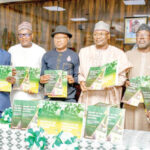Elections are just around the corner. By this day and time next week, Nigerians would be discharging one of their civic duties of electing leaders in the first round of the 2023 general elections; the Presidential and National Assembly elections. Elections must be seen as a democratic pathway into better political and socio-economic days; a means to an end, not an end in itself. Every stakeholder including voters, contestants, party supporters, INEC staff, election officials, and security agents should work to ensure that the forthcoming elections are held peacefully. All forms of fake news, intimidation, political thuggery and other electoral offences that would trigger violence must be eschewed. All the terms of the peace pact anchored by the General AbdulSalami-led National Peace Committee and signed by political parties participating in the elections across the country should be respected.
Meanwhile, reports in the media have mentioned at least six states where violence is likely to erupt during the elections. The Civil society Legislative Advocacy Centre (CISLAC) has named Oyo, Imo, Rivers, Kaduna, Benue, and Borno as prone to violence ahead of next week’s general elections. CISLAC said violence usually occurred in these states at every round of general elections. The Executive Director of the CISLAC, Auwal Ibrahim Musa (Rafsanjani), made the remarks while addressing journalists at the end of the stakeholders meeting and press conference recently held at the Kakanfo Inn, Ibadan, Oyo State.
Election is not, and should not be war. Neither should it be a matter of do or die affair. No matter how desperate a candidate feels about winning an elective position; no matter how zealous or otherwise a party supporter feels about a particular candidate in an election; no matter how hard an election official fraudulently works for or against a candidate; and no matter how all political factors or calculations appear to be in favour or against a candidate; “fate”, in the words of my senior colleague, Malam Mahmud Jega, “would always trump efforts.” Success in any contest is, therefore, not determined by anyone’s effort(s) but by what destiny has long prepared for him or her. The final decision in every matter rests with Allah; the Disposer of all affairs including general elections. “Man”, they say “proposes whereas Allah disposes.” While man may have a choice in stage-managing his aspirations, that choice does not extend to fate or destiny, which is Allah’s prerogative.
The belief that whatever happens to one is determined by fate is called “destiny”. Belief in destiny (the pleasant and the horrible) is one of the six basic articles of faith in Islam. The faith of a Muslim is incomplete if he does not believe in destiny. The birth of every soul marks the beginning of its journey on the pathway to the various bus-stops of destiny. Imam Bukhari and Muslim both relate in the fourth hadith of Annawawi’s collection that the Prophet (SAW) said, “(At birth) four words of command are given (to the angel about man), namely that he writes down his fortune, his life span, his works, and whether he will be miserable or prosperous…” Whatever has been destined to be will be; and what has not been destined to be shall never be.
It is destiny that while some people would contest elective positions several times without being victorious even once, others will contest once and win. It is also destiny that others would win elective positions only after standing in elections several times. It is destiny that while some people are born with silver spoon in their mouths; others come with a ‘wooden’ one. People do not become leaders because they are clever. Others are also not followers because they are daft or imbecile. People are not poor because they are lazy They are also not wealthy because they are strong. All is by destiny.
Whatever has been destined to come to man as fortunes will surely come. And that which has not been ordered to come one’s way will never come. The native speakers of Hausa would say, “Rabon kwado baya hawan sama” meaning, “The shares that are due to the frog never hang up in the sky.” Allah will surely bring it low as to enable the frog to grasp it. The Prophet (SAW) said in the nineteenth hadith of Annawawi’s collection that, “Know that if the (whole) community should make a united effort to benefit you in any matter they would not benefit you in anything except what Allah has prescribed for you, nor were they to make a united effort to harm you in any matter, they would not harm you in anything except what Allah has prescribed for you. The pens have been lifted and the pages are dry.” No man has the right to change the fate of any candidate in an election except that which has been penned down for him as destiny.
While all revealed religions teach that destiny is natural and outside the control, management and authority of man, the journey on the path of destiny is required to be guided by certain theological principles. Hope, faith, self-confidence, hard work, personal discipline, humility, prayer, patience, endurance and perseverance make a man’s voyage on the path of destiny friendlier. Success and not failure, progress and not retrogression, happiness and not sadness, bliss and not adversity, optimism and not pessimism, confidence and not hopelessness should be the catchphrases on the mind of every ‘wayfarer’ on the pathway to destiny.
We encourage parents to talk to their children to believe in destiny by shunning violence in any form and by any means; before, during and after the elections. Candidates in the elections and party leaders should enlighten their supporters to believe in destiny by refraining from any act that would affect the credibility of the elections. Community and religious leaders should respectively preach to their subjects and followers to believe in destiny by remaining law-abiding during and outside of election seasons.
Elections should move the country forward, not backward. Believing that man could have a choice in his ambitions, not destiny; it’s only reasonable and God-fearing that we realize our limitations as human beings in the pursuit of our individual and/or collective ambitions. May Allah guide us to collectively go into the 2023 general elections and come out of them in the most peaceful and dispassionate atmosphere, amin.

 Join Daily Trust WhatsApp Community For Quick Access To News and Happenings Around You.
Join Daily Trust WhatsApp Community For Quick Access To News and Happenings Around You.


